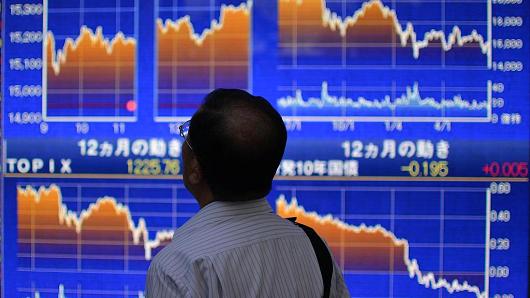Asian stocks slumped with U.S. futures; The Yen rose, the Euro was steady

Asian stocks slumped with U.S. futures, the Treasury yield curve edged closer toward inversion and the yen climbed on Thursday as the investor aversion to risk that’s been prevalent for much of the quarter resumed.
Losses deepened in afternoon trading, with the MSCI Asia Pacific Index on track for the worst back-to-back drop since October. Hong Kong shares were among the worst performers after the arrest of the chief financial officer of China tech giant Huawei Technologies Co. reignited concerns about U.S.-China tensions. Oil fell back below $53 a barrel in New York. Yields on 10-year Treasuries dipped below 2.9 percent, bringing them all the nearer to two-year rates. With inversions widely seen as a red flag for a future recession, the trend has added to global investor jitters. The yuan resumed declines.
After U.S. markets were closed Wednesday to honor former President George H.W. Bush, S&P 500 Index futures had a volatile start Thursday. Selling pressure forced CME Group to pause trading intermittently, said a spokesperson for the exchange.
While China’s pledge on Wednesday to move quickly on trade commitments to the U.S. had helped ease selling pressure in equities yesterday, news that Canada has arrested the chief financial officer of Huawei and may extradite her to the U.S. could put a damper on sentiment. U.S. President Donald Trump said Wednesday that China was sending “very strong signals” on trade.
“This move against the Huawei CFO has just added another spanner in the works,” Eleanor Creagh, strategist at Saxo Capital Markets, told Bloomberg TV in Sydney. “It’s really illustrative of the fact that the trade truce we saw over the weekend between Trump and Xi doesn’t really do much to mend the underlying relationship between the U.S. and China that is still deteriorating.”
Elsewhere, Bank of Japan Governor Haruhiko Kuroda said economic risks from abroad could be severe, and the Federal Reserve’s Beige Book report showed fading optimism over growth prospects at U.S. firms even as most districts continued to report a modest expansion. The Australian dollar fell for a third day after trade data missed estimates.
The pound remained in focus as U.K. Prime Minister Theresa May searched for a compromise to avoid a crushing defeat on her Brexit deal in a key vote in Parliament next week.
Some of the key events investors will be focused on this week:
- OPEC ministers meet in Vienna Thursday.
- Friday brings the U.S. monthly employment report for November.
- China November trade data are due on Saturday.
And here are the main moves in markets:
Stocks
- The MSCI Asia Pacific Index slid 1.9 percent as of 1:45 p.m. in Tokyo, down more than 1 percent for a second straight day.
- Japan’s Topix Index dropped 2.2 percent.
- Hang Seng slumped 2.6 percent.
- Australia’s S&P/ASX 200 Index fell 0.5 percent.
- Futures on the S&P 500 Index slid 1.3 percent.
- Futures on the U.K.’s FTSE 100 Index dropped 1.2 percent.
Currencies
- The yen rose 0.5 percent to 112.66 per dollar.
- The offshore yuan lost 0.4 percent to 6.8859 per dollar.
- The euro was steady at $1.1344.
- The British pound was at $1.2724, down 0.1 percent.
Bonds
- 10-year Treasury yields dipped four basis points to 2.87 percent.
- The yield on Australia’s 10-year bonds dropped five basis points to 2.45 percent.
Commodities
- West Texas Intermediate crude fell 1.1 percent to $52.33 a barrel.
- Gold rose 0.2 percent to $1,240.07 an ounce.
Source: Bloomberg





























